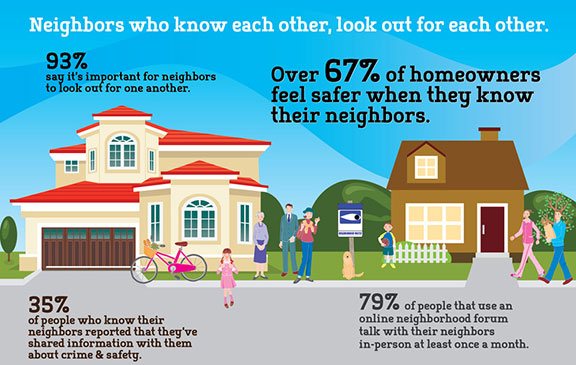In a dream world, nothing external will affect the value of your home. As long as you’ve kept the place in tip-top condition and the market’s on your side, you should have no problem selling at or above the listing price—right? Just don’t forget about the neighbors.
One bad apple can make selling your home a struggle. Whether their yard looks like something out of “Hoarders,” their home is classified as a biohazard zone by the EPA, or they’re just plain rude, lousy neighbors can throw off a sale. They can even drag down the value of your home by as much as 10%, according to the Appraisal Institute.

Most neighborly disputes don’t have a legal remedy. Your best option: a diplomatic conversation, a smile, and crossed fingers. Sometimes the solution, sadly, is dropping your asking price and getting the hell out of Dodge.
And once in a while, the law does have your back.
Here are three common types of abysmal neighbors—and advice for handling them when your house is on the market.
#1 The neighbor who wants your home
If your neighbors are dreaming of expanding, they might have an eye on your house and no qualms about shooing off competitors. Every realtor has dealt with his share of bad neighbors—including a vindictive neighbor desperate to buy.
“Every time someone would pull in to see the home, he would conveniently make himself available to answer questions and eagerly share his story about how the former owners were crack or meth addicts,” he says. “He’d say they dealt drugs from the home, that there were people coming and going at all hours.”
From all the evidence, the neighbor’s story was untrue—but it sure served to scare people away.
How to deal? You could sell the home to your neighbors, but if they expect a neighborly discount (or have turned you off with their poor behavior), you need to sit them down for a frank conversation: They aren’t getting the house. If they continue to frighten potential buyers, consult a lawyer. You may have a case to sue them for slander—but expect the road to success to be bumpy.
#2 The neighbor with a bad attitude
Maybe your neighbor’s just a miserable dude, eager to make you (and the whole block) equally miserable. Ailion recalls one particularly messy dispute over a neighbor who installed a peephole in his side door to spy on another neighbor’s wife. More? He kept animals in the backyard and tossed them trash to eat. Oh, and he also shot his gun in the air while walking down the street.
These less-than-savory attributes made the home a nightmare to sell. Ultimately, Ailion says the owners sold their house to an out-of-state buyer who “did not ask about the neighborhood or why we were selling,” and never bothered to speak with anyone else on the street. Eight months later, the buyer called to request help.
“My advice was to tell him it’s his problem, and to try to get along with his neighbor,” Ailion says.
But hoping your buyer doesn’t do due diligence may not be an option. Lawrence J. Buckfire, a lawyer in Southfield, MI, recommends working with other neighborhood residents to solve the issue—they might be willing to band together to approach them.
Whatever you do, make sure to consult with your agent and attorney about what you need to disclose, especially if you’re dealing with potentially criminal elements, says Edward Smith of NewPoint Law Group in Roseville, CA. This depends on your state, and your Realtor will have more information.
“If the sale goes through, and the neighbor continues to do terrible things to the new owner, they might sue you for failure to disclose a defect,” Smith says.
#3 The neighbor who trashes the neighborhood
Not everyone keeps their property perfectly clean, and you’d be a fool to expect as much—even from good neighbors. But when unkempt becomes unmitigated disaster, selling your home can be a nightmare.
Ailion recalls a property he represented that shared a long driveway with a neighbor and made no effort to make the path look acceptable. Offenses included a border of halved tires; a white painted line denoting the property division; dead, rusting cars; and a flag pole with “one of the largest Confederate flags I have seen.”
Plus, a no trespassing sign “stating: This home is protected by Smith & Wesson.”
But there’s nothing legally objectionable here. You might have a case with the cars or other junk on the property—take photos, document the situation, and get in touch with the municipal or local authorities. But everything else is just bad manners.
“Unfortunately, most neighbor disputes are very difficult to remedy in our legal system,” Smith says. “Most lawsuits involve payment of money damages for tangible harm. Most neighbor disputes are not about money, but trying to correct behavior.”
If you’re dealing with a true problem home—like a house filled with frat bros who like to party 24/7, or worse, a drug den—your first step should be talking with the neighbors and the homeowners association, if possible.
“The association can offer to mow the lawn, clean up debris, or take other necessary action under their by-laws,” Buckfire says.
Unfortunately, sometimes the only answer to a bad neighbor is to drop the price. It’s certainly not fair, but who told you life was fair? At least you won’t have to see a huge Confederate flag every morning when you leave for work.
Jamie Wiehe (Realtor.com) has written about home design and real estate for House Beautiful, Elle Decor, Veranda, and more. She loves vintage furniture, collecting fluffy blankets, and DIY-ing everything.
